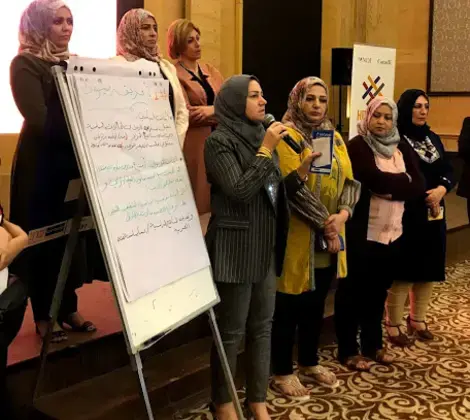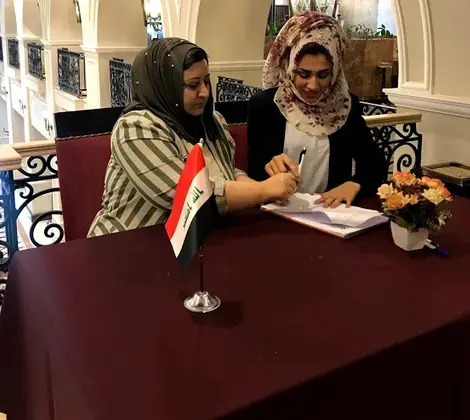
WAB members from Anbar. Photo credit: NDI-Iraq.
Success Story
Iraqi Women Unite to Help Local Governments Respond to Priorities
Nearly two years after the defeat of the Islamic State in Iraq and Syria (ISIS), communities are working to rebuild, and local governments are challenged to respond to citizens’ needs in order to win their trust. Yet, decision-makers often overlook the perspectives of Iraqi women, who have disproportionately suffered from conflict and who, as caretakers in their households, have a deep understanding of their families’ and communities’ needs. Now, women leaders in five provinces liberated from ISIS are uniting to advise their provincial councils on how to implement policies that would improve the lives of all citizens, especially the most marginalized.
This new experience of Women Advisory Boards in Iraq will help elevate women's voices in the provinces.
A Women’s Advisory Board member from Anbar
In September, the National Democratic Institute (NDI) convened a select group of women from Anbar, Diyala, Kirkuk, Ninewa and Salahaddin to launch Women’s Advisory Boards (WABs), independent committees that will provide policy recommendations, as well as implement local projects, in order to promote gender-sensitive problem-solving. Each of the five WABs, one in each province, is composed of about 17 women from all walks of life – teachers, lawyers, health professionals, NGO workers, businesswomen, housewives – whose backgrounds embody the vibrant cultural diversity of Iraq. They are already actively making a difference, from helping internally displaced persons, to campaigning against gender-based violence, to advocating for the rights of people with disabilities. Their ultimate goal is to help create inclusive provinces where women and girls, youth and elderly, people with special needs, and religious or ethnic minorities can sustain their livelihoods, access education and healthcare, and move freely and safely, without fear of violence or discrimination.

“This new experience of Women Advisory Boards in Iraq will help elevate women's voices in the provinces,” said a woman from Anbar, recognizing the importance of her efforts.
Iraq’s provincial councils play a key role in delivering services to citizens, but they have limited powers, resources, or capacity to fulfill their mandates. While the WAB members understand that strengthening governance will take time, they know that the process will only succeed in the long-run if it is inclusive. Increasing women’s participation in governance can help shape policies that are more responsive to all the needs, interests and realities that compose society.

Newly-elected members of the Salahaddin WAB’s executive committee sign their bylaws into effect. Photo credit: NDI-Iraq
At the September conference in Erbil organized by NDI as part of a three-year program supported by the government of Canada, WAB members from the five provinces met for the first time to focus on gender-inclusive governance. During the event, the participants were provided with examples of women’s groups in Canada and around the world who contributed to building women-friendly environments and policies that “work for them.” WAB members practiced analyzing and developing policies through a gender lens, and identified the root causes and gender-differentiated impacts of priority issues in their communities.
“The conference helped us to develop a roadmap to see how we can tackle the challenges we face,” said a WAB member from Diyala.
The WAB members demonstrated their knowledge of local issues by raising concerns about the most vulnerable populations. “Women with disabilities are very marginalized and not seen as human beings. In this program, we need to be inclusive and integrate all the components,” said a participant from Kirkuk.
Faced with the challenge of winning buy-in from key leaders in their provinces, the WAB members strategized about how to engage their respective local governments in order to gain credibility as advisors on gender-related matters.
“This conference enabled me to structure my thoughts. After three days of work with my peers from other provinces, I realize that there is still a long way to go; we need to unify our efforts,” said one participant from Ninewa at the conclusion of the event.
Following the conference, each WAB held its first regular meeting and elected its executive committee. WAB members adopted bylaws and codes of conduct, and signed declarations of commitment, which formalized the creation of the WABs as independent institutions with defined missions and processes. In the coming weeks, they will consult with local citizens and members of their provincial councils to develop small-scale projects aimed to address specific needs in their communities. These projects will be the WABs’ first public push to rally support for their vision of more inclusive and responsive governance.



